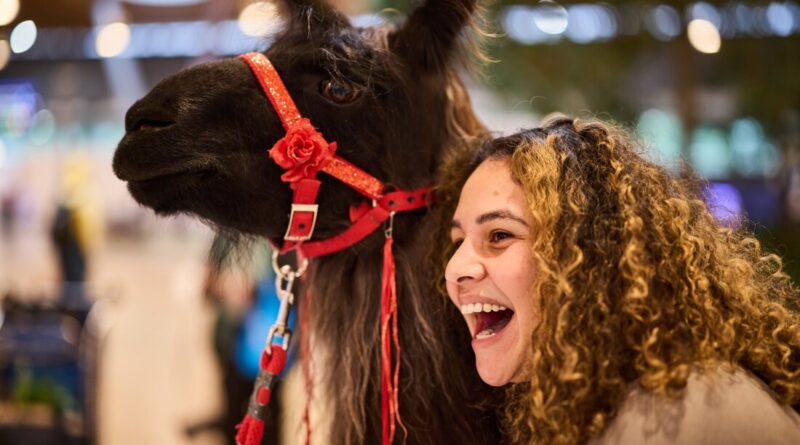Worried at the Portland airport? Beni the Llama is here for you, spreading happiness
Beni the llama hugs and makes a passenger laugh at Portland International Airport last week.
Jay Fram for NPR
hide description
toggle caption
Jay Fram for NPR
When Beni the llama and Captain Jack the alpaca saunter and their caretakers walk through the front doors of Portland International Airport on a recent morning, time seems to stand still.
People who were busy earlier at their gates are standing still! Those who were busy on their phones looked up and looked. Others take videos. A crowd forms quickly. Within minutes, twelve people are standing in line for the chance to have their pictures taken with one of these animals.
At least one traveler is crying.
Lori Sackett, who is moving from Portland to San Antonio with her husband to see their grown daughter, says: “You can tell by my answer how happy I feel when I see these animals outside. “What a gift.”
Sackett has missed the llamas ever since she worked with them in a 4-H youth group when her daughter was young – the same daughter she would visit. “He’s going to go crazy when he sees the photos,” says Sackett. “I mean, it’s amazing.”
Magic is the word suggested by more than one visitor who stops their journey for a few minutes to get to know these animals. Part of the Portland airport’s animal therapy program, the animals visit every few weeks from the farm where they live – called Mountain Peaks Therapy. When they are not at the airport, they have a busy schedule that includes business events and weddings.
Their airport appearance is part of the airport’s effort to acknowledge that travel is a concern, says Allison Ferre, a spokeswoman for the Port of Portland. The airport’s latest development also features live trees bathed in natural light and high ceilings constructed from local Douglas Fir. “Being in nature relieves stress,” says Ferre. “The coming therapy animals are just another way to provide that for the guest experience.”
Captain Jack the Alpaca has a job to do: to make the guests happy. He obviously does.
Jay Fram for NPR
hide description
toggle caption
Jay Fram for NPR
But the excitement on this day goes beyond the definition of stress relief or nature viewing. Every now and then, people gasp and cry in amazement as they hug the soft necks of these gentle animals or stroke their fluffy ears.
Sackett says the llama’s magic is hard to describe without hearing it. “Have you caught one?” she explains – “I mean – they’re simple and beautiful. Sweet faces.”
Therapy programs with animals at the airport are different from emotional support or animal services, which are often accompanied by individuals. On the other hand, therapy animals are insured and certified by organizations such as animal hospitals or industry groupsand subject to minor state and federal regulations.
There is some evidence that animals in therapy programs have a calming effect on humans, but “the truth is we need more research,” says Nancy Gee, director of the University’s Center for Human-Animal Interactions. of Medicine at Virginia Commonwealth University. Although therapy animals can include a wide variety of species such as fish and horses, most of the research available is on dogs.
“It’s magical,” says Lori Sackett, who went in for a llama “carrot kiss”. Seeing the animals made him cry.
Jay Fram for NPR
hide description
toggle caption
Jay Fram for NPR
Support for these animal ambassadors is largely based on their immediate evidence – that people are surprised and happy to meet animals at the airport. “These programs are very popular,” says Gee. “People absolutely love them.”
“I think dogs express the same feelings,” says Sackett. “But isn’t this a million times more beautiful?”
Not all llamas and alpacas qualify for this type of therapy, however, according to Shannon Joy, co-owner of Mountain Peaks Therapy. Joy says: “Llamas and alpacas are very herd oriented. “They feel safer among their peers.”
Working with local shepherds, he is looking for animals that he can recruit “that want to know about us as humans. That shows that the animal is confident.”
In order to be certified as therapy animals, llamas and alpacas receive extensive training, says Joy. Among other things, animals must learn to tolerate being handled by many people. “Maybe 1 in 15 llamas will have that level of self-confidence and physical independence.” He puts the number of Alpacas at one in 75. “It’s very rare.”
A favorite trick of both animals is “carrot kissing,” which is shoving a carrot into a person’s mouth.
Shannon Joy (left) and her mother Lori Gregory of Mountain Peaks Therapy Llamas & Alpacas, pose with Beni and Captain Jack at Portland International Airport on October 31, 2024.
Jay Fram for NPR
hide description
toggle caption
Jay Fram for NPR
Varun Kataria was initially nervous, but was eventually convinced. “Oh, it’s okay. I will try,” he laughs and hands the carrot with his teeth to Beni the llama. “Good job!” Says Joy. “The magical one?”
“I don’t think I’ve ever put my mouth in an animal’s mouth,” said Kataria, who was on her way home from a work trip. It’s kind of a confusing experience.
Kataria says she feels stressed after the trip, and feels busy with plans for a Diwali party later.
But after this moment, he says, “I feel happy.” The experience of kissing a llama brought him out of his worries.
#Worried #Portland #airport #Beni #Llama #spreading #happiness
